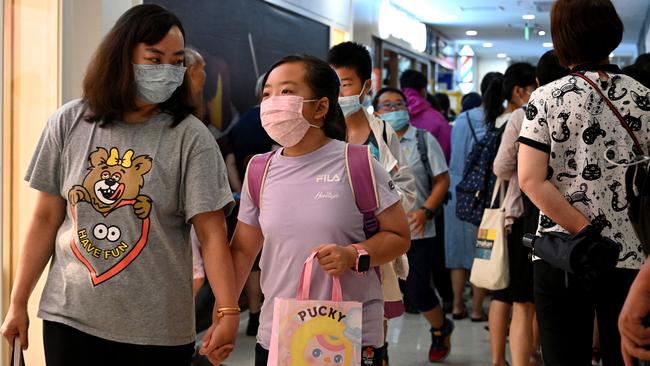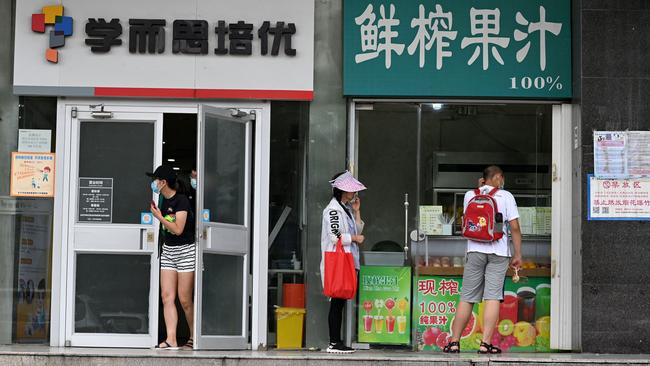
But in many ways this is simply a by-product of a far more fundamental change in China -- a new revolution in its education system.
And that revolution has profound implications for the long-term outlook for Australia’s tertiary education system, which is hoping for a return of Chinese students next year as the nation’s vaccination rate passes 80 per cent.
It might even impact Chinese tourism in coming years.
To understand the importance of this change I need to explain how the Chinese education system worked and why it propelled China into a technology powerhouse.
China’s Beijing-Shanghai-Jiangsu-Zhejiang region ranks highest in the world in reading, mathematics and science. The talents that came from of this incredible educational achievement are shown in Chinese technology leadership in many areas, including the emergence of technology giants like Alibaba, Tencent and ByteDance.
But the best illustration of Chinese technology was shown when the US in its simulated war games was thrashed by China, which has become the dominant air power in our region, helped by the fact that the Joint Strike Fighter - F35 aircraft was branded “useless”.
Education was not only at the core of these developments but a major contributor to China’s growth and prosperity.
To be assured of a top position in Chinese society students needed to obtain a degree from the best Chinese universities. To gain admission, students had to achieve very high marks. Wealthy Chinese families and the rising middle class spent large sums on tutoring their children to enable them to achieve those required marks. The Chinese families’ intense desire for the success of their children ---boosted by the one child, one family policy ---created a $100 billion online tutoring industry, including many listed companies. Chinese tech giants Alibaba, Tencent and ByteDance and others jumped on the bandwagon.
The tutoring sector became part of China’s high-technology corporate thrust as top companies used their role in tutoring as a talent breeding ground.
Last March China’s Ministry of Education classified the tutoring sector’s teaching materials and content as publications subject to advanced censorship. The government was making sure that students were not exposed to western and other ideas outside the Chinese model. That was merely the first step.
Three or four months later the government banned those tutoring firms from making a profit by teaching core subjects after school. China’s cabinet also restricted foreign investment in such companies.
The Chinese government authorities will now have a greater role in deciding what people can read and watch in the country and have urged better “culture and art reviews” by limiting the role of algorithms (in part read analysis of ratings) in content distribution.
Beijing wants to align online content with the state’s agenda and to rein in the role of capital and technology in shaping the country’s minds and mainstream views.
Tutoring will continue but on a much smaller scale and Western system ideas will be on the banned list.

A large number of the Chinese students who came to Australia and transformed our tertiary education system came from families where the children did not make it to the elite level.
Those Chinese families, many of them struggling financially, believed that a western education would also assist in success in China and it also offered a chance to diversify family assets out of China with a place to go if things turned nasty. This was particularly important in Hong Kong. That driver will continue.
For some years China has been concerned that its students in Australia were exposed to ideas that did not conform with the Chinese view of the world. Our universities and governments were concerned that campus freedoms were being reduced. It was a simmering but unresolved issue.
In the light of the dramatic changes in Chinese education there is a clear danger that this will become a major issue in Chinese students coming to Australia.
My guess is -- and it’s not a definitive forecast -- that Chinese students numbers will fall dramatically in the years ahead. Universities will need to rely on students from other countries and more locals.
Meanwhile not only were highly-educated students from the Chinese system talent drivers but the Chinese found the capital and entrepreneurial culture in the West as the perfect value-creating partnership. Accordingly the high-tech sectors became very closely linked.
The US investment banking sector saw an opportunity and created what are called variable interest entities (VIEs ). Many Chinese companies used VIEs to access US capital. But VIEs were actually shell companies based in tax havens. They give investors an economic interest in the company’s operation but no traditional ownership or voting rights. The total value of Chinese listed companies in the US is around $US2 trillion and VIEs are an important part.
The whole mutual co-operation system was designed for a different political era and is now very dangerous.
The share market is getting a whiff of what the education changes in China plus trade wars may mean to the US capital markets.
The US itself is demanding better disclosure and higher auditing standards for these enterprises.
We are looking at a big global change with profound short and long term implications.




Global financial markets are concentrating on the massive China crackdown on its high technology industry and its close links with the US and the western world.